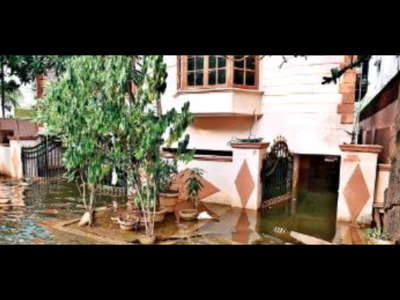The Times of India 11.08.2010
‘Cost of an apartment in Bangalore is so high’
BANGALORE: In terms of population, London and Bangalore are rather similar. But the two cities are strikingly different in how they tackle development issues, mainly traffic infrastructure and road widening, says Dr Neeraj Patil, mayor of Lambeth, who is currently in Bangalore. The one-time Gulbarga boy shares his observations and best practices of London.
Excerpts from an interview:
What’s lined up during your visit?
I’m here to meet the mayor, his council and BBMP commissioner as well to discuss about the two cities.
What are the similarities between Lambeth and Bangalore?
There’s not much difference in terms of population. What’s different is the way we look at development problems.
In what way do we differ?
It’s mainly traffic and infrastructure. It’s not just the movement of vehicles but the economy. Under present conditions in Bangalore, even if you’re a millionaire, there isn’t much you can do when you have a heart attack at home and have to be rushed to hospital. We need efficient public transport. There are many new buses now. It’s good, but we must do away with open-door buses; all must have a lock mechanism under the driver’s control.
What do you think about road widening that’s being debated?
Road widening is good — it has worked in the West because there are no problems with illegal encroachments. Here, it’s so clearly visible. You need a political will to dismantle them completely. Under existing conditions, you need to work on a `compulsory purchase order’. In London, if a road has to be widened and there are properties along the way, there’s no option but to issue a compulsory purchase order. We compensate people thoroughly; ensure the owner gets market value. Registration price is not a true reflection of real value.
What are other alternative measures?
Congestion zone charging — it worked in London and will work in Bangalore. You identify the central economic zone and charge vehicles entering it, particularly cars.
What are common issues the two cities face?
Housing — the cost of an apartment in Bangalore is so high. In London, any builder who builds more than 13 residential units has to give something back to the council as subsidiary housing. Part of it will go as social houses to those who have nothing. The poor remain as council tenants. The moment they become well-off, they must either vacate or pay the market value. There’s a special squad to monitor this. The other remaining houses are on part-buy -part-rent scheme for those with middle or moderate income. You cannot sublet but live there yourself.
What’s your view on crime in Bangalore?
I don’t think Bangaloreans completely trust the police. If they did, why aren’t all cases being registered? Many victims hesitate to approach the police. In Britain, we trust the police 100%. You cannot fight crime when there’s no trust. We need to have a local police consultative community group for every area that comprises local inspectors, corporator and residents. Emergency healthcare too needs a facelift. There, it’s a state machinery but here, people depend heavily on private hospitals.
What are Bangalore’s best practices?
I can’t comment as I’m not an elected member in Bangalore. But, we surely have a lot to learn from Bangalore in the way it supports small businesses. The city must not lose it with the growing mall culture.
How do you balance your work as a doctor and mayor?
It’s 80% as mayor and the rest a doctor. I don’t want to lose my medical skills.
Why did you choose to be the mayor of Lambeth and not Bangalore?
(Laughs) There is corruption everywhere. But in India, corruption is affecting the nation’s growth. I’m keen on promoting accountable democracy in the developing world. I’m staying away from electoral politics in India but it doesn’t mean there’ll be no political activity in India. But, I’m unwilling to run for political office in India.


